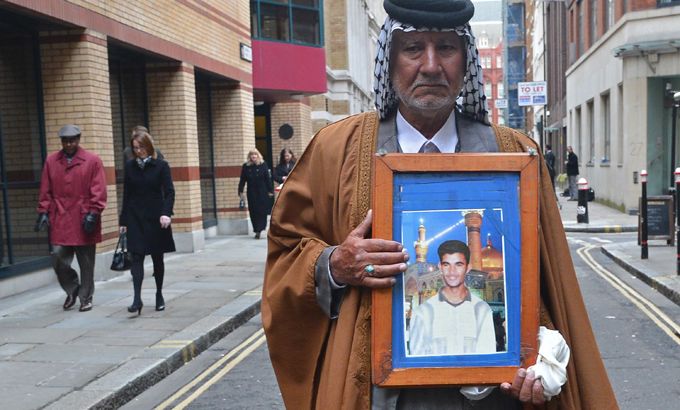UK probe into Iraq ‘atrocities’ begins
Father of man killed in 2004 alleges military tortured his son after detaining him, a charge the UK army denies.

An Iraqi father has told a London public inquiry that he saw signs of torture on his son’s body, as an investigation
into allegations of atrocities committed by British troops in Iraq in 2004 kicked off.
Mizal Karim al-Sweady was the first of 60 Iraqi witnesses to give evidence to the al-Sweady inquiry into the disputed circumstances of 28 deaths during or after a battle at the Danny Boy checkpoint in southern Iraq.
The inquiry is named after al-Sweady’s son Hamid, one of a group of Iraqi men allegedly captured alive and killed in detention. The military denies the allegations.
The elderly al-Sweady arrived in court on Monday carrying a framed photograph of Hamid alive. His son was aged 19 at the time he died.
‘Wire marks and bruises’
As part of his evidence, al-Sweady was shown a gruesome photograph of Hamid’s corpse and asked to describe injuries he says he saw on his body shortly after his death.
Speaking through an interpreter, al-Sweady said he had cleaned his son’s body before burial and had seen wire marks around his neck, bruises on his chest, a broken jaw, a bullet wound in the neck and one in the leg.
“I turned my son’s body around with my hand. I confirmed the injuries right after the doctor did,” he said.
It is the second major British public inquiry into military conduct in Iraq. The long-running inquiries have helped keep alive a public debate about why Britain got involved in the US-led invasion of Iraq and how the war was conducted.
Iraqi witnesses allege British soldiers captured a number of men during the battle at Danny Boy, about five kilometres from the town of Majar al-Kabir, and took them to Camp Abu Naji base where some were murdered and mutilated and others tortured.
The military denies any unlawful killings or ill-treatment in the aftermath of the battle on May 14, 2004.
There is no agreement about the exact number or identities of the dead and whether they died fighting or in detention.
Testimony challenged
Al-Sweady’s testimony has been challenged by several lawyers who noted discrepancies between three witness statements he gave in 2004 and 2010.
He was asked to elaborate on his account of seeing several bodies with eyes plucked out and tongues and noses cut off at the hospital where he collected his son’s body.
Pressed to be specific, he told the inquiry he had seen one body with a broken-up nose and one with eyes plucked out.
Al-Sweady denied changing his account over time, suggesting that his statements had not been written down correctly by British military police who had investigated the episode.
The hearings, expected to last about a year, will involve flying 15 Iraqi witnesses to London and another 45 to Beirut where they will give evidence by video link from the British embassy. About 200 British military witnesses will also testify.